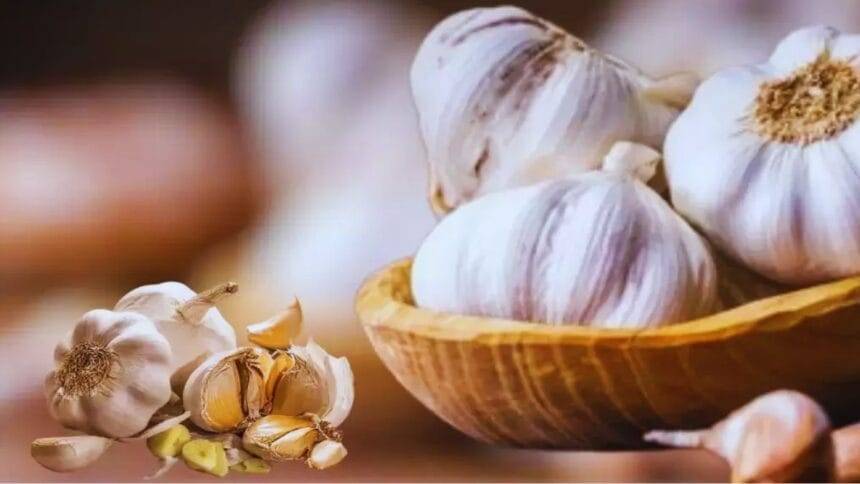Main Points In Hindi (मुख्य बातें – हिंदी में)
-
चीनी लहसुन का बढ़ता कारोबार: भारतीय बाजार में चीनी लहसुन की प्रचुरता है, विशेषकर दक्षिण भारत के कुछ राज्यों में, जिससे किसान और व्यापारी नुकसान में हैं। कर्नाटका में इस विदेशी लहसुन के खिलाफ प्रदर्शन बढ़ गए हैं।
-
किसानों का चिंता: मणगलुरु और उडुपी में किसानों का कहना है कि चीनी लहसुन की बिक्री उनकी स्थानीय उपज से अधिक हो रही है, जिससे उनके आर्थिक नुकसान में वृद्धि हो रही है।
-
सरकारी कार्रवाई: उडुपी के नगरपालिका आयुक्त ने व्यापारियों की शिकायतों पर चीनी लहसुन के एक बड़े थोक विक्रेता पर छापा मारकर पांच क्विंटल लहसुन जब्त किया और इसे बाजार में जारी करने से पहले उसकी वैधता सुनिश्चित करने का आश्वासन दिया।
-
कीमतों का अंतर: भारतीय लहसुन की कीमत पिछले कुछ समय में 250 रुपये प्रति किलो है, जबकि चीनी लहसुन 50-60 रुपये प्रति किलो की दर पर बिक रहा है, जिससे ग्राहक चीनी लहसुन को पसंद कर रहे हैं।
- बाजार पर प्रभाव: व्यापारियों का मानना है कि चीनी लहसुन की बढ़ती बिक्री भारतीय लहसुन की कीमतों को स्थिर कर देगी। इसके कारण भारतीय लहसुन की कीमतें 175-150 रुपये प्रति किलो के आसपास आ सकती हैं।
Main Points In English(मुख्य बातें – अंग्रेज़ी में)
Here are the main points from the provided text regarding Chinese garlic in the Indian market:
-
Surge of Chinese Garlic: There is an abundance of Chinese garlic in the Indian market, particularly in South India, where it is increasingly affecting local farmers and traders.
-
Farmers’ Protests: Farmers in Karnataka, especially in Mangaluru and Udupi, are suffering losses due to the over-supply of Chinese garlic, leading to intensified protests against its sale.
-
Price Disparity: Indian garlic is priced significantly higher at around Rs 250 per kg compared to Chinese garlic, which sells for Rs 50-60 per kg. Chinese garlic’s size and ease of use make it appealing to customers.
-
Market Regulation Efforts: In response to complaints from local traders, authorities have started taking action, such as seizing Chinese garlic from wholesale markets to ensure compliance with trade regulations.
- Economic Impact: The influx of Chinese garlic is affecting market prices, with expectations that the prices of Indian garlic will stabilize at lower rates due to its availability, influencing the profits of Indian garlic traders.


Complete News In Hindi(पूरी खबर – हिंदी में)
भारतीय बाजार में चीनी लहसुन की भरपूर मात्रा है। आप जहाँ भी देखेंगे, आपको चीनी लहसुन दिखाई देगा। खासकर दक्षिण भारत के कई राज्यों में चीनी लहसुन का बिक्री अधिक हो रही है। इसके कारण किसान और व्यापारी नुकसान उठा रहे हैं। यही कारण है कि इस विदेशी लहसुन के खिलाफ प्रदर्शन बढ़ गए हैं। कर्नाटका में विरोध की आवाज़ सबसे ज्यादा सुनाई दे रही है। यहाँ मंगलुरु और उडुपी में किसानों और व्यापारियों ने अपने विरोध को तेज़ कर दिया है।
मंगलुरु और उडुपी जिलों के बड़े और छोटे शहरों में चीनी लहसुन की बड़ी मात्रा देखी जा रही है। दक्षिण कन्नड़ शहरों में इसकी भरपूर मात्रा के कारण किसान चिंतित हैं। किसानों का कहना है कि चीनी लहसुन की बिक्री उनके उत्पाद से अधिक हो रही है, जिससे उनका नुकसान बढ़ रहा है। इस मुद्दे पर किसानों और व्यापारियों ने शिवमोगा में अपने विरोध को और तेज़ कर दिया है।
साथ ही पढ़ें: बिहार में बाढ़ का कृषि पर गंभीर प्रभाव, जीवन और संपत्ति का भी बड़ा नुकसान
व्यापारियों की शिकायतों के बाद, उडुपी नगर आयुक्त बी. रायप्पा ने एक थोक विक्रेता पर छापा मारा और आदि उडुपी में कृषि उपज और पशुपालन बाजार समिति (एपीएमसी) यार्ड से पांच क्विंटल चीनी लहसुन जब्त किया। उन्होंने व्यापारियों को आश्वासन दिया कि वे लहसुन को बाजार में तभी जारी करेंगे जब उसकी वैधता की सुनिश्चितगी कर ली जाएगी।
चीनी लहसुन क्यों बेचा जा रहा है?
व्यापारियों का कहना है कि भारतीय लहसुन की कीमत 250 रुपये प्रति किलोग्राम है, जबकि चीनी लहसुन 50-60 रुपये प्रति किलोग्राम के आसपास बिक रहा है। उन्होंने कहा कि ग्राहकों को चीनी लहसुन पसंद है क्योंकि इसका आकार बड़ा होता है और इसे छीलना और मसलना आसान होता है। मंगलुरू में एपीएमसी के अधिकारियों के अनुसार, चीनी लहसुन थोक विक्रेताओं द्वारा व्यापार लाइसेंस के तहत बाजार में आया है।
उन्होंने यह भी कहा कि रेहड़ीवालों को चीनी लहसुन का व्यापार करने के लिए कोई विशेष व्यवसाय लाइसेंस की आवश्यकता नहीं है।
पुराने बंदरगाह क्षेत्र के एक थोक विक्रेता मोहम्मद इशाक ने पीटीआई को बताया कि चीनी लहसुन समय-समय पर भारतीय बाजार में आता है। हालांकि, उनके अनुसार, यह बाजार में लहसुन की कीमत को संतुलित करता है।
साथ ही पढ़ें: ऊंट के दूध से जुड़ी ये 12 बातें क्या आप जानते हैं, नहीं तो यहाँ पढ़ें
इशाक ने बताया कि भारतीय लहसुन की कीमतें, जो पहले 200-225 रुपये प्रति किलोग्राम पर थीं, चीनी लहसुन के बढ़ने के कारण 175-150 रुपये प्रति किलोग्राम पर स्थिर हो जाएंगी। हाल के समय में लहसुन और प्याज की कीमतों में भारी बढ़ोतरी हुई है। यही कारण है कि चीनी लहसुन का बाजार में बढ़ावा हुआ है क्योंकि व्यापारी इससे अधिक मुनाफा कमा रहे हैं और इसकी आपूर्ति करना भी आसान है।
Complete News In English(पूरी खबर – अंग्रेज़ी में)
There is abundance of Chinese garlic in the Indian market. Wherever you look, you can see Chinese garlic. Especially in many states of South India, Chinese garlic is being sold more. Farmers and traders are suffering losses due to this. This is the reason why protests against this foreign garlic have intensified. The voices of protest are being heard most in Karnataka. Here in Mangaluru and Udupi, farmers and traders have intensified their protests.
A huge quantity of Chinese garlic is being seen in big and small cities of Mangaluru and Udupi districts. Its quantity is visible in large quantities in the cities of Dakshina Kannada due to which the farmers there are worried. Farmers say that more Chinese garlic is being sold than their produce, due to which their losses are increasing. Regarding this, farmers and traders have intensified their protest in Shivamogga.
Also read: Bihar floods have serious impact on agriculture, loss of life and property is also huge
Following complaints from traders, Udupi Municipal Commissioner B Rayappa raided a wholesaler and seized five quintals of Chinese garlic from the Agricultural Produce and Livestock Market Committee (APMC) yard in Adi Udupi. He assured the traders that he will release the produce in the market only after ensuring the validity of Chinese garlic.
Why is Chinese garlic being sold?
Traders said that the price of Indian garlic varieties is Rs 250 per kg, while Chinese garlic is being sold at Rs 50-60 per kg. He said customers like Chinese garlic because it is larger and easier to peel and crush. According to APMC officials in Mangaluru, Chinese garlic has come into the market under trade licenses held by wholesalers.
He also said that retailers do not need a special business license to trade Chinese garlic.
Mohammad Ishaq, a wholesaler in the old port area, told PTI that Chinese garlic appears in the Indian market from time to time. However, according to him, it balances the price of garlic in the market.
Also read: Camel Milk: Do you know these 12 things related to camel milk, otherwise read here
Ishaq said Indian garlic prices, which were trading at Rs 200-225 per kg, will stabilize at Rs 175-150 per kg due to the influx of Chinese garlic. In recent times, there has been a huge increase in the prices of garlic and onion. This is the reason why the influx of Chinese garlic has increased in the market because traders are earning more profits on it and its supply is also easy.








